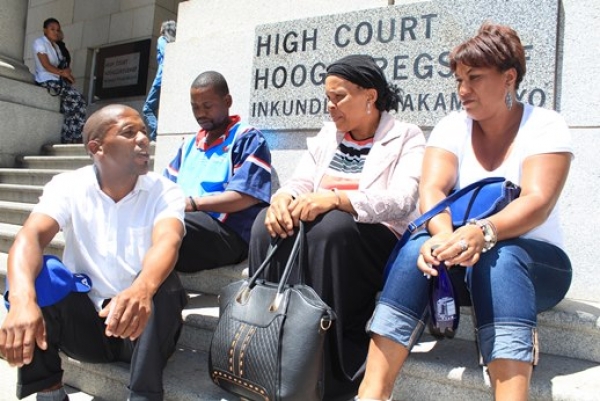

Jeffery Haarhof, Bulelani Mehlomakhulu, Angelie Arrija and Lisinda Bailey are members of a group of consumers who sucessfully had their emolument attachment orders scrapped in the High Court. Photo: Masixole Feni
22 July 2019
A disciplinary hearing into the conduct of a firm of attorneys that facilitates debt collection on behalf of several credit providers will be heard soon, according to Jaco Fourie, senior legal officer at the Legal Practice Council.
The hearing comes more than four years after Western Cape High Court Judge Siraj Desai declared garnishee orders against 15 consumers “invalid and unlawful”.
Desai also ordered that an investigation be done into the practice of debt collecting at Flemix & Associates Incorporated and to establish whether it had breached its ethical duties.
Garnishee orders, also known as emolument attachment orders (EAOs), force an employer to deduct money owed to a creditor directly from the monthly salary of the person in debt.
In 2014 the Stellenbosch University Law Clinic and 15 consumers brought a lawsuit against several creditors who were represented by Flemix for obtaining garnishee orders to deduct amounts from their salaries from courts in cities and towns far from where they lived or worked. Called forum shopping, this practise of obtaining garnishee orders was widely used by credit collectors at the time. It resulted in many borrowers not being able to attend the hearings in person, denying them access to the courts and justice.
The Clinic has since 2001 brought dozens of applications to rescind or reduce illegal or unjustified garnishee orders. In some cases, borrowers were granted loans that were practically impossible to repay from their modest salaries.
In 2016, the Constitutional Court agreed with the High Court’s findings that the mechanism of EAOs needed greater judicial oversight to protect against abuse. The court also said that no more than 25% of a borrower’s salary can be deducted.
The disciplinary hearing was initially meant to happen in May this year but was postponed to give Flemix’s lawyers time to prepare. On Thursday, Fourie told GroundUp that the hearing was “back on the roll” and “would take place soon”. He said Flemix’s lawyers had not yet filed its representations to the council.
Meanwhile Flemix director, Alanza Flemix-Jordaan, said in an email that she plans on defending the allegations. She will argue forum shopping “was widely used by all practitioners doing large scale legal debt collections” and that they “were in accordance with the law at the time”.
Flemix-Jordaan said that the firm had stopped the practise for more than two years. “It it is no longer a cost effective debt collection process for the client or the debtor.”
She said that since the courts stopped issuing EAOs, it took away “the only efficient debt collection method for unsecured debt”.
Stephan van der Merwe, senior attorney at the Stellenbosch University Law Clinic, said the hearing against Flemix was a significant step in further reforming the micro-lending industry. Van der Merwe and Odette Geldenhuys of Webber Wentzel also plan to make representations to the Council during Flemix’s disciplinary hearing.
“We have experienced a marked decrease in the number of related cases referred to our office. The judgments and resulting legislative ammendments has undoubtedly had a serious impact on the activities of the worst offenders of EAO abuses,” he said.
Desai noted in his judgment in 2015 that Flemix had about 150,000 files with a book value of about R1.6 billion.
“This means that hundreds of thousands of debtors and their families stand to be impacted by whatever decision the LPC reaches,” said Van der Merwe.
He said that the impact of the court judgments was already being felt by ordinary borrowers. “It has played a pivotal role in the decrease of abuses regarding debt matters. Whether the judgments have however succeeded in causing a complete turnaround in the bad debt and credit industry, is a question that is still up for debate,” he said.